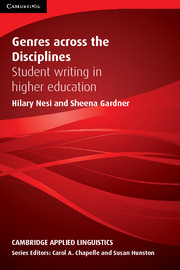Book contents
- Frontmatter
- Contents
- Series editors’ preface
- Abbreviations
- Acknowledgements
- Part I Investigating Student Writing: From Corpus to Genre Family
- 1 Investigating student writing with the BAWE corpus
- 2 Families of genres of assessed writing
- Part II Social Functions of University Student Writing
- 3 Demonstrating knowledge and understanding
- 4 Developing powers of informed and independent reasoning
- 5 Developing research skills
- 6 Preparing for professional practice
- 7 Writing for oneself and others
- 8 Networks across genres and disciplines
- Appendices
- Index
4 - Developing powers of informed and independent reasoning
Published online by Cambridge University Press: 07 January 2021
- Frontmatter
- Contents
- Series editors’ preface
- Abbreviations
- Acknowledgements
- Part I Investigating Student Writing: From Corpus to Genre Family
- 1 Investigating student writing with the BAWE corpus
- 2 Families of genres of assessed writing
- Part II Social Functions of University Student Writing
- 3 Demonstrating knowledge and understanding
- 4 Developing powers of informed and independent reasoning
- 5 Developing research skills
- 6 Preparing for professional practice
- 7 Writing for oneself and others
- 8 Networks across genres and disciplines
- Appendices
- Index
Summary
[A]ssumptions of rationality . . . underpin the processes of higher education. . . .. Graduates . . . are expected to be able to ‘think’ creatively and imaginatively about their discipline but also . . .to be able to apply that creativity to different contexts. Learning to argue, then, could be seen to be a central purpose and activity of attendance at the university.
(Andrews, 2000: 5)In Chapter 3 we examined the importance of developing disciplinary knowledge, and how arguments at university build on such understandings (Section 3.5). We start this chapter with an exploration of expectations of evaluation and argumentation from different perspectives. In Section 4.2 we introduce the six genres in the Critique genre family and the six genres in the Essay genre family. We then focus on shared and contrasting genre features found in introductions, headings and hyperNews. These give us a sense of the organisation and stages of Critiques and Essays. In Section 4.3 we explore disciplinary variation through moves involving the use of first person I and IF–THEN reasoning. In the final section (4.4), we review the basic statistics and multidimensional analysis of Critiques and Essays, then explore keywords in the two genre families, and conclude with a focus on disciplinary variation in the language of Essays, the most populated genre family in the BAWE corpus.
Critical Evaluation and Argumentation
Independent reasoning is developed through critical evaluation and the devising of sustained arguments, which we suggest are semiotically rather distinct processes. They involve the construal of knowledge and understanding in support of a critical appraisal or of a position on an issue. Such links between understanding, argumentation and evaluation are echoed in the Quality Assurance Agency (QAA) frameworks for England, Wales and Northern Ireland:
Bachelor’s degrees with honours are awarded to students who have demonstrated
• conceptual understanding that enables the student to devise and sustain arguments, . . . and comment upon particular aspects of current research, or equivalent advanced scholarship, in the discipline
. . .
Typically [BA Hons] holders will be able to: . . . critically evaluate arguments, assumptions, abstract concepts and data . . .
(QAA, 2001/2008: 18–19, emphasis added by authors)As we explained in Section 3.5, there is an assumption that conceptual understanding (such as that displayed in Explanation genres) is inextricably linked to ‘devising and sustaining arguments’ as well as ‘evaluating current research, concepts and data’.
- Type
- Chapter
- Information
- Genres across the DisciplinesStudent Writing in Higher Education, pp. 89 - 133Publisher: Cambridge University PressPrint publication year: 2012

